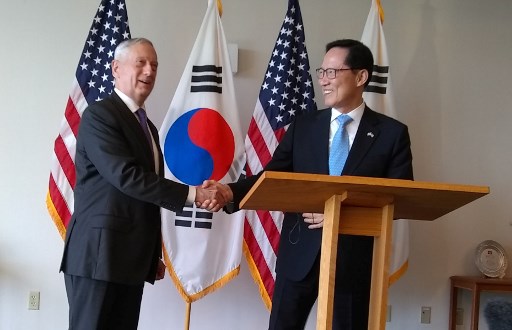
/ AFP PHOTO / Sylvie LANTEAUME
HONOLULU, United States (AFP) – The United States and South Korea are going to keep tightening the screws on Pyongyang so that the hermit state gives up its nuclear program, Pentagon chief Jim Mattis said Friday.
“As two peace-loving nations, the Republic of Korea and America welcome the Olympic Games talks between the ROK and DPRK while at the same time remaining steadfast with the international economic pressure campaign to denuclearize the Korean peninsula,” Mattis said in Honolulu.
The defense secretary was speaking at the start of a meeting with his South Korean counterpart Song Young-Moo at US Pacific Command, or PACOM, headquarters.
“Diplomacy should repose reason on Kim’s reckless rhetoric and dangerous provocations,” Mattis said, warning that the Winter Olympics talks and the respite in inter-Korean ties that accompany them do not solve overarching problems.
“The Kim regime is a threat to the entire world… Our response to this threat remains diplomacy-led, backed up with military options available to ensure that our diplomats are understood to be speaking from a position of strength.”
Pyongyang has agreed to send athletes and support delegations to the South for the Winter Olympics in Pyeongchang next month and form a unified women’s ice hockey team with the South.
The move followed months of entreaties from Seoul to take part in a “peace Olympics,” prompting a rare and rapid improvement in the atmosphere on the peninsula.
But the North is also preparing a massive military parade in Pyongyang on February 8, a day before the Winter Olympics’ opening ceremony.
The North has long said it is open to talks without preconditions, but the US says it must first take concrete steps towards denuclearization, although the administration of President Donald Trump has at times sent mixed and conflicting messages on the issue. (Agence France-Presse)







